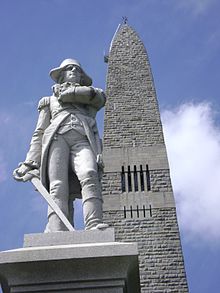Seth Warner
| Seth Warner | |
|---|---|

The Seth Warner statue at the Bennington Battle Monument
|
|
| Born |
May 17, 1743 Roxbury, Connecticut (then a part of Woodbury) |
| Died |
December 26, 1784 Roxbury, Connecticut |
| Buried at | Seth Warner Burial Site, Roxbury, Connecticut |
| Allegiance |
|
| Service/branch |
|
| Years of service | 1775–1780 |
| Rank | Colonel |
| Unit | Green Mountain Boys, officially known as Warner's Regiment (1775–1776) and Warner's Additional Regiment (1776–1780) |
| Battles/wars |
Capture of Fort Ticonderoga Capture of Fort Crown Point Battle of Longueuil Battle of Hubbardton Battle of Bennington |
| Relations | Remember Baker, Olin Levi Warner |
Seth Warner (May 17, 1743 [O.S. May 6, 1743] – December 26, 1784) was a Revolutionary War officer from Vermont who rose to rank of Continental colonel and was often given the duties of a brigade commander. He is best known for his leadership in the capture of Fort Crown Point, the Battle of Longueuil, the siege of Quebec, the retreat from Canada, and the battles of Hubbardton and Bennington.
Before the war, he was a captain in the Green Mountain Boys. He was outlawed by New York but never captured.
In the final years of the war, he remained loyal to the United States while the independent state of Vermont negotiated separately with the British.
Seth Warner was born on the Connecticut frontier in hilly western Woodbury, now Roxbury. He was the fourth of ten children born to Dr. Benjamin Warner and Silence Hurd Warner. His grandfather was Dr. Ebenezer Warner.
Although Warner was not related to Ethan Allen, both men were cousins of Remember Baker, another notable Green Mountain Boy captain.
An early historian wrote that Warner was “a fortunate and indefatigable hunter."
As a teenager he served for two summers in the French and Indian War.
Warner had a common school education. He learned the rudiments medicine from his father. A 1795 account of his life asserts that he had “more information of the nature and properties of the indigenous plants and vegetables, than any other man in the country” and “administered relief in many cases, where no other medical assistance could at that time be procured.”
In 1763 his father purchased land in Bennington, now in the state of Vermont, a town that was chartered by a grant from the colonial governor of New Hampshire, Benning Wentworth. Beginning in the mid-1760s, New York asserted that the boundary of the colony extended to the Connecticut River and the New Hampshire Grant charters were illegitimate.
It is likely the Warner family worked their land in the New Hampshire Grants for two summers before settling full-time in 1765. Seth Warner was chosen highway surveyor and then captain of the town’s militia company.
...
Wikipedia
